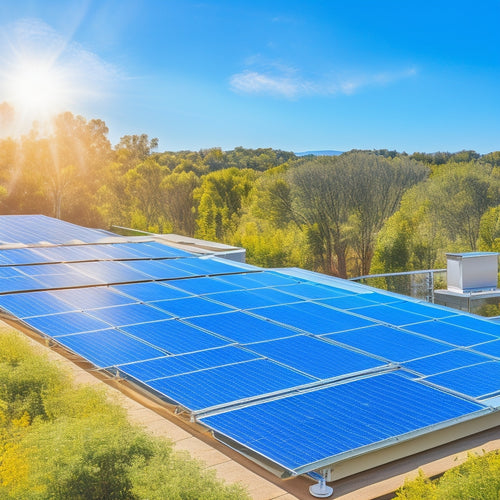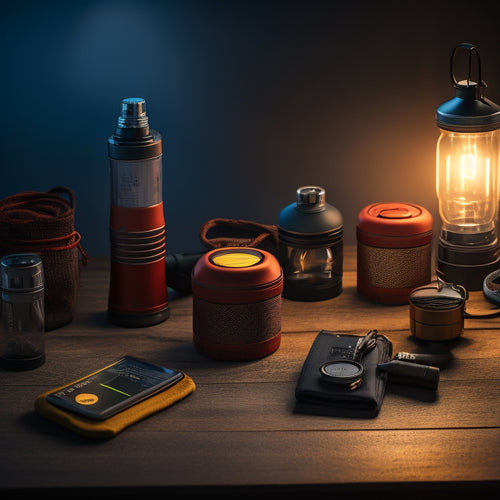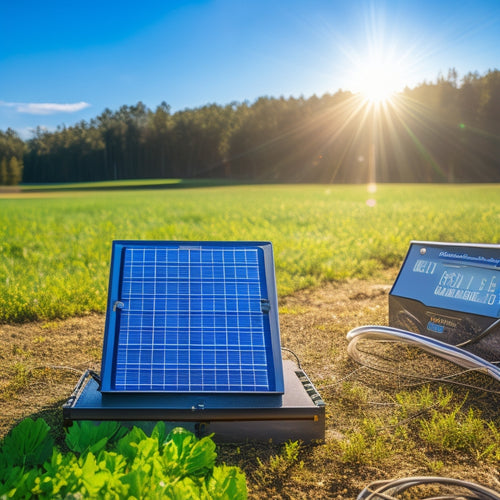
Home Electric Battery Backup
Share
You've installed a home electric battery backup system, providing reliable power during outages and eliminating reliance on noisy generators. This setup guarantees essential appliances, refrigeration, and lighting remain operational when the grid fails. With integration into solar panels, you'll minimize fossil fuel reliance and reduce your carbon footprint. Your deep cycle battery technology will perform at peak efficiency with proper care, and understanding cycle depth is key to maximizing its lifespan. Now that you've got the basics covered, you can enhance your system's performance by calculating your wattage needs, prioritizing appliances, and learning more about what makes your backup system tick.
The Essentials
- Home electric battery backup systems provide uninterrupted power during outages, ensuring essential appliances and lighting remain operational.
- Integration with solar panels allows for renewable energy storage, minimizing reliance on fossil fuels and reducing carbon footprint.
- Deep cycle battery technology impacts backup system performance, with typical batteries lasting 5-7 years and AGM batteries up to 15 years with proper care.
- Accurate calculation of wattage requirements is critical for reliability, utilizing load calculation and nameplate rating to size the battery backup system.
- Home electric battery backup systems can last over 10 years, requiring less maintenance than generators and providing extended power outage support.
Reliable Power During Outages
You can rest assured that your home electric battery backup system will provide power during outages, guaranteeing a reliable supply of electricity when you need it most.
This is possible thanks to energy storage solutions that work in tandem with your grid connection, seamlessly switching to battery power when the grid fails.
With a reliable battery backup for home, you can prevent food spoilage and maintain safety by keeping critical home systems, such as refrigeration and lighting, running smoothly during unexpected power outages.
Power During Outages Guaranteed
A reliable home electric battery backup system guarantees power during outages, providing homeowners with uninterrupted access to electricity when it's needed most.
When the grid fails, your system kicks in, making certain you stay connected, productive, and safe. With a battery backup, you're protected from the unpredictable nature of utility power, and you can enjoy the freedom to live life on your own terms.
By investing in a Solar Power Backup system, you can say goodbye to the hassle of noisy, polluting generators Energy Storage System and the financial losses associated with prolonged power outages.
To guarantee your system performs flawlessly during outages, you'll want to prioritize battery maintenance. This includes regular checks on battery health, state of charge, and temperature.
Proper installation is also vital, as it directly impacts the system's overall efficiency and reliability. When installing your battery backup, make sure to follow installation tips such as selecting a location with adequate ventilation, avoiding extreme temperatures, and making sure the system is properly grounded.
Energy Storage Solutions Work
Energy storage solutions, such as home electric battery backup systems, have proven to be effective in providing reliable power during outages. When you invest in a home battery backup, you're guaranteeing your home remains powered even when the grid goes down. This means you'll have access to essential appliances, lighting, and heating or cooling, giving you energy independence.
By utilizing advanced battery systems and renewable energy storage, homeowners can alleviate the burden of high energy bills and reduce grid dependence, providing them with greater energy independence. These systems integrate seamlessly with solar panels, allowing you to capture renewable sources of energy and store excess power for later use.
Smart technology guarantees efficient charging and discharging, maximizing your cost savings. Additionally, advanced battery maintenance features monitor and optimize performance, extending the lifespan of your batteries.
With load management capabilities, you can prioritize power allocation to critical systems, guaranteeing your home remains comfortable and safe.
Reduced Carbon Footprint Guaranteed
You can greatly minimize your reliance on fossil fuels by integrating a home electric battery backup into your power system, effectively reducing your carbon footprint.
By storing excess energy generated from renewable sources like solar or wind power, you'll be utilizing eco-friendly power solutions that lower emissions today.
With the ability to stay powered during outages, you can guarantee a steady flow of energy, even when the grid is down, and also reduce your reliance on standby power systems.
You'll be producing fewer greenhouse gases, contributing to a cleaner environment for future generations.
Eco-Friendly Power Solutions
In today's environmentally conscious world, homeowners are seeking innovative ways to reduce their carbon footprint, and eco-friendly power solutions have become an essential part of this pursuit.
As you investigate sustainable living options, you'll find that solar integration and renewable resources are key components of a reduced carbon footprint. By incorporating green technology into your home, you're making eco-conscious choices that minimize your environmental impact.
With energy efficiency as a top priority, you'll want to evaluate smart home solutions that optimize your energy usage. This is where home electric battery backup systems come in, providing a reliable source of power while reducing your reliance on non-renewable energy sources.
As you aim for carbon neutrality, you'll be contributing to a cleaner, greener future. Future innovations in eco-friendly power solutions will continue to shape the way we live, making sustainable living more accessible and convenient.
Lower Emissions Today
By integrating a home electric battery backup system, homeowners can drastically reduce their carbon footprint, achieving a significant decrease in greenhouse gas emissions and air pollutants.
You'll be contributing to a cleaner environment, free from the constraints of fossil fuels. With a battery backup system, you can store excess energy generated by your solar panels or wind turbines, reducing your reliance on the grid and lowering your emissions.
As you shift to sustainable living, you'll notice a significant decrease in your carbon footprint. By utilizing clean energy, you'll reduce your reliance on non-renewable energy sources, minimizing air pollutants and greenhouse gas emissions.
You'll be taking an essential step towards a more sustainable future, where energy independence is a reality.
Deep Cycle Battery Technology
You're likely aware that the lifespan of your deep cycle battery greatly impacts your home electric battery backup system's overall performance.
When it comes to renewable energy storage, the right deep cycle battery can make all the difference. The battery life expectancy is directly tied to the number of charge cycles it can handle, with a typical deep cycle battery lasting around 5-7 years.
When selecting a deep cycle battery, it's essential to take into account the cycle depth, which refers to how deeply the battery is discharged before being recharged, as this affects its overall lifespan and performance.
Battery Life Expectancy
Deep cycle batteries, designed to provide backup power during outages, have a limited lifespan that depends on various factors, including usage patterns, charging cycles, and environmental conditions.
As you consider investing in a home electric battery backup system, it's crucial to understand the variables affecting your battery's life expectancy.
You'll find that different battery types have distinct lifespans. Flooded lead-acid batteries typically last between 5-10 years, while sealed gel or AGM batteries can last up to 15 years.
Maintenance tips, such as guaranteeing proper charging and avoiding deep discharging, can greatly extend your battery's lifespan. You should also monitor your battery's state of charge, as overcharging can reduce its overall lifespan.
Regular maintenance and inspections can help identify potential issues before they become major problems.
Cycle Depth Matters
As you focus on maximizing your battery's life expectancy, it's important to understand the intricacies of deep cycle battery technology, particularly the concept of cycle depth.
Cycle depth refers to the percentage of a battery's capacity that's discharged before it's recharged. A deeper cycle depth means more energy is withdrawn from the battery, which can affect its overall lifespan.
When it comes to battery maintenance, it's vital to strike a balance between cycle depth and cycle longevity. A shallow cycle depth can lead to premature wear on the battery's cells, reducing its overall lifespan. On the other hand, a deep cycle depth can cause excessive wear on the cells, also reducing lifespan.
Ideally, you want to aim for a moderate cycle depth that allows for efficient energy storage and retrieval while maintaining the battery's health.
To achieve this balance, it's important to monitor your battery's state of charge and adjust your energy usage accordingly. By doing so, you can guarantee peak battery maintenance, extend its lifespan, and enjoy the freedom and independence that comes with a reliable home electric battery backup system.
Count Your Wattage Needs
You'll need to calculate your wattage requirements to determine the right size of your battery backup system.
To do this, you'll want to identify the essential appliances you want to power during an outage and calculate their total wattage load.
Considering residential battery systems can provide a reliable backup power supply, it's crucial to accurately determine your energy needs.
Home energy storage systems can help you achieve energy independence.
You can use one of two methods to calculate your wattage needs: either estimate the total load of your appliances or add up the individual wattage ratings of each device.
Wattage Calculation Methods
Calculating your wattage needs is an essential step in determining the ideal home electric battery backup system for your specific requirements. To accurately estimate your power consumption, you'll need to calculate the total wattage of the appliances you want to back up during an outage.
There are two primary methods for wattage estimation: the "load calculation" approach and the "nameplate rating" method.
The load calculation approach involves measuring the actual power consumption of each appliance using a wattmeter or Kill A Watt meter. This method provides the most accurate results, especially for devices with variable power consumption, such as refrigerators and air conditioners.
The nameplate rating method involves checking the nameplate or manufacturer's specifications for each appliance's maximum power rating. This method is simpler but may overestimate your actual power consumption.
Regardless of the method you choose, be certain to calculate the total wattage of all appliances you want to back up simultaneously. This will guarantee you select a battery backup system that can handle your power needs during an outage, giving you the freedom to live life uninterrupted.
Essential Appliance Priorities
Now that you've determined your wattage calculation method, it's time to identify the appliances you need to prioritize during an outage. This is vital for effective power management and guaranteeing your essential needs are met. You must decide which appliances are must-haves and which can wait.
Start by categorizing your appliances into three tiers. Tier one includes critical systems like refrigeration, medical equipment, and lighting. Tier two consists of important but non-essential appliances like computers, televisions, and small kitchen appliances. Tier three includes non-essential items like hair dryers and coffee makers.
When selecting appliances for your battery backup system, consider your emergency preparedness goals. Identify the appliances that will help you maintain a comfortable and safe living environment during an extended outage.
For example, if you have a family member with medical needs, you may prioritize a refrigerator or oxygen concentrator. By prioritizing your appliances, you can guarantee your battery backup system meets your essential needs and provides the freedom you desire during an emergency.
Longer Lifespan Than Generators
You'll appreciate that home electric battery backup systems can provide extended power outage support for up to 10 years or more, depending on the type and quality of the batteries.
In contrast, traditional generators typically require more frequent maintenance and replacement, with a typical lifespan of around 5-7 years.
With a battery backup system, you'll enjoy a longer lifespan and reduced maintenance needs, ensuring your home stays powered during extended outages.
Extended Power Outage Support
During prolonged power outages, a reliable backup system can be a lifesaver, and that's where home electric battery backup systems shine. They provide extended power outage support, allowing you to live life as usual even when the grid fails. With a battery backup system, you can enjoy freedom from the uncertainty of when the power will come back on.
To guarantee your system runs smoothly during extended outages, it's crucial to follow battery maintenance tips and outage preparedness strategies. Here's a breakdown of what you need to take into account:
| Outage Scenario | System Requirements | Your Action Items |
|---|---|---|
| Short outages (1-4 hours) | Minimal battery capacity, standard inverter | Check system status, verify batteries are charged |
| Medium outages (4-12 hours) | Medium battery capacity, efficient inverter | Monitor energy usage, adjust loads as needed |
| Long outages (12-24 hours) | Large battery capacity, high-capacity inverter | Implement energy-saving measures, prioritize essential loads |
| Extended outages (24+ hours) | High-capacity battery bank, grid-forming inverter | Rotate backup power sources, perform routine system checks |
Frequently Asked Questions
Can I Install an Electric Battery Backup System Myself?
You can attempt a DIY installation, but it's essential you consider safety first, ensuring you've got the necessary knowledge and follow proper protocols to avoid electrical shocks, fires, and other hazards that can put your life and property at risk.
How Often Should I Maintain My Home Battery Backup System?
You're like a skilled chef, ensuring your battery backup system is always "fresh" by checking its state of charge every 3-6 months, as neglect can "spoil" its lifespan, impacting performance and overall freedom from grid dependence.
Are Electric Battery Backup Systems Compatible With Solar Panels?
You'll find that most battery storage systems are designed for seamless solar integration, offering compatibility and enhanced benefits like reduced energy waste, increased self-sufficiency, and optimized performance, giving you freedom from grid reliance.
Can I Use My Battery Backup System for Off-Grid Living?
Will you ever be truly free from the grid? You're closer than you think! With a battery backup system, you can access off-grid efficiency, but it depends on your battery capacity - can you utilize enough power to sustain your independence?
Are There Any Government Incentives for Home Battery Backup Systems?
You're eligible for federal programs like the Investment Tax Credit, offering up to 26% of your system's cost, and state incentives, such as rebates or credits, which vary by location, to offset the expense of your home battery backup system.
Final Thoughts
As you flip the switch, the lights flicker back to life, like a phoenix rising from the ashes of a blackout. With a home electric battery backup, you're the ruler of your domain, untethered from the grid's whims. Calculate your wattage needs, control the power of deep cycle batteries, and bid farewell to fossil fuels. Your carbon footprint shrinks, your peace of mind grows, and your lights stay on - no matter what the grid throws your way.
Related Posts
-

What Types of Solar Energy Devices Are Available
You'll find several types of solar energy devices available today, each customized to different energy needs. Photovo...
-

Best Solar Powered Flashlights for Emergency Situations
When you're choosing the best solar-powered flashlights for emergency situations, focus on their brightness, battery ...
-

Choosing the Right Solar Power Charge Controller
Choosing the right solar power charge controller is crucial for maximizing energy efficiency and extending battery li...


